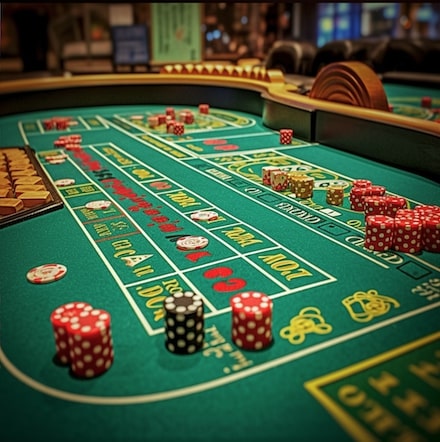
Casino games have long been a engaging form of entertainment, drawing numerous of players from diverse cultures around the globe. From the lively casinos of Vegas to the thriving gambling halls of the Cotai Strip, these games serve as a common thread that unites people across a variety of backgrounds. The allure of luck, skill, and uncertainty entices not only those seeking to gamble for profit but also those looking for a feeling of belonging.
The influence of casino games extends significantly past the gaming floor. They often reflect the social norms and principles of the cultures in which they thrive. Games such as Texas hold ’em, pontoon, and roulette have embedded themselves into the fabric of cultural phenomena, influencing multiple fields from cinema to style. As we explore this fascinating intersection of luck and life, we can comprehend better how these games shape and are influenced by the environment surrounding us.
Historical Progression of Gaming Activities
The beginnings of gaming activities can be tracked back to historical cultures, where betting in different forms was extensively engaged in. no verification casino In the East, around 2300 BC, a variant of luck game known as Keno was well-known, while in ancient the Roman Empire, soldiers would frequently wager on the consequences of their contests. The notion of using luck for fun and gain progressed over the years, leading to the formation of more formal activities. By the end of the Middle Ages, betting houses began to emerge in the continent, particularly in the Italian peninsula, which presented early forms of famous activities still practiced today.
As gambling gained recognition in Europe, the 17th and 18th centuries saw the appearance of gambling establishments as dedicated establishments for gambling. The initial official casino, the Ridotto, was founded in Venice in 1638, offering games like the game of Baccarat and Faro games. This period marked a crucial shifting point, as casinos started to attract not just the elite but also the burgeoning middle-income class. The refinement of activities grew, leading to the creation of new guidelines and variations that enhanced the gaming experience.
In the 19th century, the industrial age and shifts in social standards also altered the environment of gaming activities. The arrival of the game of roulette and modern one-armed bandits attracted a larger audience, and gambling establishments became seen as acceptable fun. This era witnessed the globalization of gambling, as gambling houses spread from the continent to the New World, culminating in the development of the famous Las Vegas Strip in the 1900s. The evolution of gambling games has progressed into the modern era, including new technologies and online platforms, making them available to a worldwide audience.
# Cultural Significance across Diverse Communities
Gambling games have significant cultural and social significance across many societies across the globe. For instance, in Las Vegas, the very core of the city is woven around gambling establishments, where playing is not just a pastime but a fundamental aspect of social engagement and community life. The bright lights and vibrant atmosphere attract a vast audience, showcasing how gambling activities can influence local economies and local cultures. This setting transforms the notion of relaxation into an engaging experience that influences style, music, and even cinema.
Conversely, some communities approach wagering with an air of caution, considering it through the lens of ethical considerations and heritage. A case in point, in numerous Oriental cultures, games like Mahjong and Pai Gow Gambling are steeped in history and have significant social relevance. These games are often played during meetings and occasions, fostering community bonds and strengthening family ties. The act of engaging in these games goes past mere amusement, reflecting principles such as respect for elders and the value of shared enjoyment.
Meanwhile, in continental countries such as the principality of Monaco and the Italian Peninsula, casino games serve as symbols of wealth and refinement. The refined atmosphere of these establishments attracts both travelers and residents, reinforcing a sense of status and rarity. The art of Texas Hold’em and the strategic elements of games like banker’s game are celebrated, shaping community relationships and establishing an allure that fascinates a heterogeneous audience. This emphasizes how games of chance can both mirror and shape societal views towards danger, benefit, and relationship building.
Economic Impact and Travel Industry
Casino games play a crucial role in the financial context of many areas, particularly those that depend significantly on tourism. The revenue produced from casino operations fuels local economies, creating jobs not only within the casinos but also but also in related sectors such as hospitality, dining, and entertainment. This surge of tourists, drawn by the allure of games and the overall gaming environment, stimulates spending across multiple local enterprises, contributing to the economic vitality of the region.
The presence of casinos often leads to the development of facilities, including hotels, transportation systems, and leisure amenities. These developments are essential in enhancing the overall tourist experience, making destinations more attractive to visitors. Additionally, many casinos invest in local communities through sponsorship of activities and charitable initiatives, further embedding themselves into the social fabric of the locality. Such contribution not only supports economic growth but also cultivates a positive reputation of the casino industry.
Furthermore, the worldwide appeal of casino games drives competitive tourism, with regions vying to attract gamblers from across the globe. Iconic destinations like Las Vegas and Macau have become identifiable with gambling culture, drawing millions annually. This advantage encourages innovation and diversification within the gambling sector, influencing trends in entertainment and accommodation that resonate beyond their borders. The consequences of this visitor influx extend wide, impacting local financial health and cultural exchanges on a worldwide scale.
